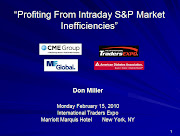 4:00pm Flip, turn, and push. 1 Down; 3 to Go
4:00pm Flip, turn, and push. 1 Down; 3 to GoFirst, with respect to today's trade, I never could get my head into the game despite strong VIX and TICK signals as it was apparent early on that I was going to be a step too quick or a step too slow (nothing to do with the market as always, it was just me). As a result, I essentially passed on taking another hard stroke into the wall and took a mental day off for the most part with a very modest +6K chip gain, which was largely the result of trading the opening oscillation and 3:15-3:30pm sequences well (yes, I got off the 3:30pm bus well before late-to-the-game buyers got crushed).
And so it's time to lock in Q1 performance which now sets the pace for the remaining three laps, and take one brief look at the 2009 starter leg by first clocking in March, followed by Q1 and the all important pace figures at the end.
March 2009
Daily Gains: $210,570
Daily Losses*: ($9,761)
Commissions: ($22,922)
Overheads: ($3,231)
Net Profit: $174,656 - 'Bout time; 3rd best behind '08 Sep & Oct.
Win/Loss Ratios:
- Days: 21-1
- Daily Gains/Losses: 22-1
Contracts Traded: 46,738
Q1 2009
Daily Gains: $462,703
Daily Losses*: ($43,569) - Yes, February 10th will haunt me all year.
Commissions: ($59,157)
Overheads: ($11,516)
Net Profit: $348,461
Win/Loss Ratios:
- Days: 58-3
- Daily Gains/Losses: 11-1
* Note there's a difference between these figures and my daily narration as daily gains or losses shown here reflect the day's activity booked by product. For example, in the case where I lost on Eurex for the day which was more than offset by U.S. gains, the Eurex trade will be included in the loss figure here while the daily narration would talk only to the net of all products.
Net Profit Pace (vs. Continuing Annual Goal of $1,000,000)
- Last twelve months: $1,650,992
- Jan-Mar annualized: $1,393,844
Observations? Not many as it's just 25% of the year and a tiny three months in a trading career (never forget the Svithjod Rock post). Nevertheless, it was nice to see a decent March after spending much of Jan & Feb trying to get the dang engine restarted after the 2008 race ended.
Yet as always, it's now history and 100% irrelevant, and in my view I enter tomorrow as I do every day ... far behind and coming off the worst loss of my life.
Now the real work begins.
Flip, turn, and push.
















14 comments:
Enjoy your blog. Thanks.
thanks for blog and nice trading, Don. btw, is your dvd course re: trading the emini still relevant to current volatility and daytrading the ES?
ATP -
It would be relevant in any market, yet I don't believe the stock has been replenished and I have no current plans to resurrect teaching.
Don
Butterfly behind you, now 3 months on your back if you are doing the I.M.
Time for the second win(d).
Great pace, and amazing consistency Don.
Quick question: Does "no regrets" on your scorecard refer to "errors of omission" as in trades not taken?
Be well, thank you.
Great performance Don, especially considering the fact that you started the year with a ONE DOLLAR goal :)
I enjoy the blog and especially knowing there is a guy out here trading from home creating...well let's say "taking wealth" into his possession.
I really dislike the term "chip stack" though. I don't think we can really equate what you do to gambling in any way if your so consistently profitable. I understand it's a lighthearted way to say, "Hey guys I made 15k today".
I get beat up verbally by so many people when I say I want to be a trader. I would be better off saying I want to start the next Enron or rob banks. That's not "gambling".
I look forward to the day when I do $150 a day lightheartedly. Keep it disciplined Don, way to go.
Appreciate the comment mtcx.
Keep in mind though that I know with conviction that trading has MANY similarities to cash (not tournament) poker, which has helped my trading immensely over the last few years as noted throughout the blog.
And while I feel there's less frequent short-term luck with trading, NEITHER is gambling as both are about probability which is ALWAYS on your side.
So the analogies to effectively and carefully managing a growing stack will continue.
Thanks for the comment though ... this diary is one person's approach and opinion as always, and I can't change what psychologically works extremely effectively for me.
Don
To mtcx. Ask any pro-poker player (who truly makes a living at his game) if he thinks he is gambling? The answer will most certainly be no! Just like trading it is a game of probablities, and the answer to winning in both poker and trading is to ONLY play your hand when the probability weighs in your favor. This requires extreme patience and as such is an excellent training in both the principles and techniques needed to succeed in trading. Believe me I've learned the hard way by overtrading "poor hands" on far too many occasions! I wish you well in your quest. It is a long long road but you will get there in the end if you truly wish to succeed at this "game". (Recommend Phil Helmuth's "Play Poker Like the Pros" - explains this very well if you are a non-poker player).
Good discussion on poker ... another reason I like the "chip stack" analogy is that, like poker, it desensitizes the fact that we're dealing with real dollars.
Plus, since for now I choose to expose my daily diary results to the public, citing chip growth keeps a needed degree of humility around.
Lastly, I need to be congnizant of my personal poker discipline problem of managing a large accumulated chip stack (often easing up or giving some back after growth), so the analogy also helps me maintain such an awareness so that I hang onto accumulated trading gains while growing it even further.
Don
Congrats on great Q1 and thanks on keeping this blog so open. There are not many other traders of your level that are doing that.
Hi Don,
Thanks for sharing your trading experiences with the public.
With regard to "overheads" for which you cite a dollar figure, what is included here? I assume that it includes such things as your CME costs, internet connections, etc. I also assume that discussion of the details may be "sensitive" and so I understand if you will not be overly open about them;general info is also appreciated. I am considering a career as a trader at some point and am trying to get info about the "business" aspects of trading... the costs, state regulatory hurdles,IRS requirements, and best business status to select(LLC, S-corp, C-corp, Sole Proprietor). Have you posted before on any of these topics? I'm in the process of working with various agencies of state and federal govt, but I'm curious about "real-world" advice. Thanks very much.
Hey bluecollar -
No problem or sensitivity whatsoever as I'm pretty much an open book.
The $3,231 for Feb reflected $2,200 CME Lease and $1,031 quote and trading platform fees.
Other overheads during the year would include my Briefing.com & Barrons subsriptions, Expo jaunts, PC upgrades, supplies, etc., but the lease and fees are the main recurring costs.
Hope that helps.
Don
mtcx: I really dislike the term "chip stack" though.
You never hear anyone on an exchange trading floor talking about dollars. It's always "ticks." Sort of like chips in a casino, you need something to desensitize yourself to the money.
Max99: Ask any pro-poker player (who truly makes a living at his game) if he thinks he is gambling? The answer will most certainly be no!
The professional poker players I know (and I know a few) happily describe themselves as gamblers. The difference they cite is that a professional gambler only risks money when he has an edge--the amateurs are just looking for action, the edge be damned.
Of course, there are plenty of caveats to this, especially when playing no-limit poker. The rock gets no action (it's hard to trap someone when you only play big pairs or big aces), while players known to have some gamble in them will get action.
An apt analogy to the rock is the trader who is always waiting for the "perfect" setup. He may wait for a long time before that comes (and maybe forever!), while passing up plenty of +EV opportunities.
The professional poker players I know tend to think like the professional traders I know--guys who are willing to gamble, but do a great job of managing the risk.
Post a Comment